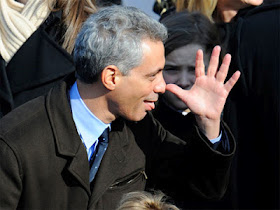Let's be clear about this: a teacher in Chicago can have a doctorate and 30 years of experience, but will never earn six-figures. Would Jonah Edelman, who never taught a day in his life, find that salary acceptable? And he's a piker:Under the currently binding contract (pdf), 2010-11 annual teacher salaries ranged from $47,268 for teachers with bachelor’s degree with a year’s experience or less, to $88,680 for those with doctorates who have at least 16 years of experience. Those in schools with longer school years (42.6 weeks or 52 compared to 38.6) make commensurately more. All told, teachers in Chicago make an average of $74,839 a year. However, the school board rescinded the scheduled 4 percent pay increase set to take effect this past school year.Teachers’ benefit package includes a choice of three health plans, with maximum out-of-pocket amounts, including deductible, ranging from $4,000 to $4,800 (or 5.3 to 6.4 percent of the average teacher’s salary). Teachers do not pay Social Security taxes or receive benefits, and instead receive a public employee pension averaging $41,584 a year for a teacher with 28 years of service.
In any case, this isn't about money, no matter how much Fox News may imply the contrary:
Emanuel has proposed that, instead of the rescinded 4 percent pay increase, teachers see a 16 percent pay increase over the next four years. The unions say they’re close to agreement on pay, though they still think higher raises are necessary to make up for rising health costs. The two sides have also already worked out a deal under which additional teachers are hired to implement Emanuel’s longer school day. [emphasis mine]The notion that teachers are overpaid in Chicago or anywhere is else is ridiculous. The notion that the union is leading a strike to gain outrageous salaries is equally ridiculous. No, this strike is about whether our kids are going to become test-taking machines or not.
The Chicago Public Schools in March unveiled an evaluation system (pdf) in which standardized testing makes up 40 percent of the rubric, a percent that increases by 5 percent every year thereafter (45 percent in year two, 50 percent in year three, etc.), which was designed by panels that included teachers, principals, and teachers’ union officials (including the president). The system goes above and beyond the state requirement that testing make up 20-40 percent of teacher evaluations. The teachers’ unions are resisting this system, calling it too punitive.Teachers teach the test when the test tests teachers. It's really that simple. Is anyone prepared to argue that what America needs right now are more children who have only learned to fill in the correct bubble on a Scantron sheet?
Yes, the Chicago teachers are standing up for themselves, but they are also standing up for their students. What Rahm Emanuel wants is detrimental to kids, but he's willing to push it if that means he can have a constantly churning workforce of younger, lower-paid teachers. Doing otherwise would mean turning to the Pritzkers and the Crownes and the Broads and the Gateses and the Waltons and the Bloombergs and demanding they start paying their fair share of taxes to fund our schools.
Can't have that, can we?
Here's what I think of having a rich curriculum, kiddos!
ADDING: As Reality-Based Educator points out in the comments, this piece is from Ezra Klein's blog, but he didn't write it: Dylan Matthews has the byline. Sorry about that.



Ezra Klein didn't write what you're posting about.
ReplyDeleteDylan Matthews did.
This was the same guy who wrote a piece on Wonkblog yesterday quantifying how much Chicago students' test scores could be hurt by the strike - even on the first day.
It was entitled "How Teacher Strikes Hurt Student Achievement."
Totally missed that, RBE. Correcting now - thanks.
ReplyDelete